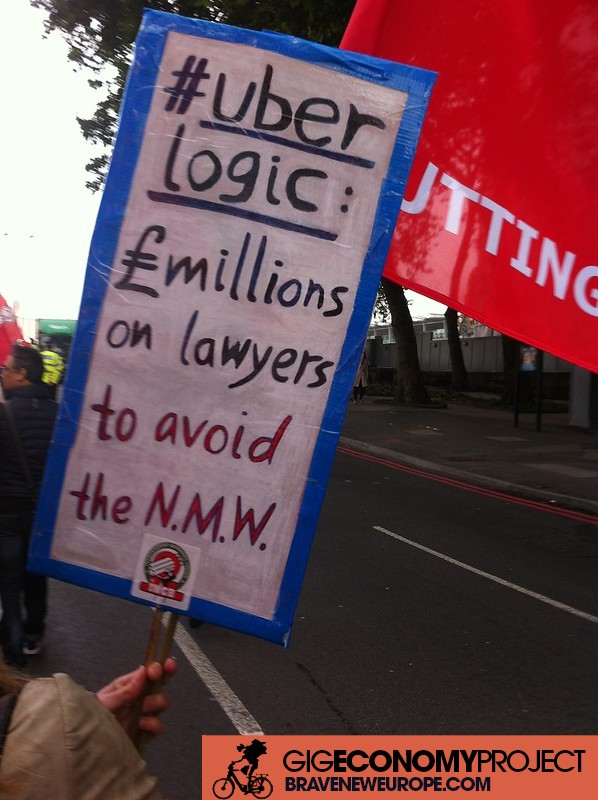Uber change in policy is a first and could have international shock waves, but the company still fell short of full compliance with the UK Supreme Court ruling last month.
The Gig Economy Project, led by Ben Wray, was initiated by BRAVE NEW EUROPE enabling us to provide analysis, updates, ideas, and reports from all across Europe on the Gig Economy.
This series of articles concerning the Gig Economy in the EU was made possible thanks to the generous support of the Foundation Menschenwürde und Arbeitswelt


In a major shift, Uber has announced that it will classify all drivers on its platform in the UK as “workers”, abandoning its long-held position that they are independent contractors.
Uber lost a landmark Supreme Court case last month which found that Uber drivers are workers. The global private hire platform initially responded to the defeat by acting like it was business as usual, leading to pressure from an increasing number of drivers filing law-suits as well as calls for the UK Government to act, before yesterday’s U-turn.
The ‘worker’ legal classification in the UK is a status between self-employed and employee, which provides some rights including the minimum wage and holiday pay, but not maternity and paternity leave nor the right to legally challenge unfair dismissal.
Uber announced that the new worker classification would mean drivers get an additional payment of 12.07% of earnings to reflect holiday pay, a pension scheme and a guarantee of the minimum wage from pick-up to drop-off.
The new minimum wage policy falls short of the Supreme Court ruling, which found that drivers were workers for Uber from the moment they log-in to the app to log-out, meaning they should be paid for their whole labouring time, including when they are waiting to get jobs.
In a statement, Uber said the Supreme Court decision “provides a clearer path forward as to a model that gives drivers the rights of worker status — while continuing to let them work flexibly, in the same way they have been since Uber’s launch in the UK in 2012.”
In an e-mail to all drivers, the company said: “We have listened to what you told us, assessed the Supreme Court judgement, and have reached the clear conclusion that you should not have to compromise on flexibility in order to benefit from new rights and protections.”
Responding to the U-turn, James Farrar and Yaseen Aslam of the App Drivers & Couriers Union, who brought the legal case against Uber, said: “While we welcome Uber’s decision to finally commit to pay minimum wage, holiday pay and pensions we observe that they have arrived at the table with this offer a day late and a dollar short, literally.
“The Supreme Court ruled that drivers are to be recognised as workers with entitlements to the minimum wage and holiday pay to accrue on working time from log on to log off, whereas Uber is committing only to accrue these entitlements from time of trip acceptance to drop-off. This means Uber drivers will still be short changed to the tune of 40-50 per cent.
“Also, it is not acceptable for Uber to unilaterally decide the driver expense base in calculating minimum wage. This must be subject to collective agreement.
“While Uber undoubtedly has made progress here, we cannot accept anything less than full compliance with legal minimums. We would also expect to see Uber make progress towards trade union recognition, a fair dismissals appeal process and a data access agreement.”
The IWGB union, which represents drivers in the UK through the United Private Hire Drivers branch, also responded to the news by calling for full compliance with the Supreme Court judgement, and called for other gig economy employers to follow suit in the worker classification.
“This massive victory for Uber drivers proves what we have said all along – you can have workers rights and flexibility,” IWGB President Alex Marshall said. “After a long hard battle Uber has been forced into a corner by the drivers and has seen that the only way out is to give the drivers what is legally theirs.
“There is more that needs to be done for Uber to comply with the law. They are still doing their best to take drivers for a ride. But this will send shockwaves across the gig-economy and sets a precedent to end the exploitative practices synonymous with the likes of Deliveroo, Bolt, Addison Lee and others.
“This is a big step in the right direction and shows what can be achieved when workers come together and fight for what is rightfully theirs.”
Jamie Heywood, Uber’s regional manager for Northern and Eastern Europe, also called on other ride-hail platforms in the UK to match Uber’s new policy.
“Uber is just one part of a larger private-hire industry, so we hope that all other operators will join us in improving the quality of work for these important workers who are an essential part of our everyday lives,” he said.
It is as yet unclear whether Uber’s shift in policy is solely UK-based or is the first move in a wider change in the company’s plan. In most European countries there is no third status between self-employed and employee. A shift to employee status would increase labour costs – which the company has always fought to keep to an absolute minimum – further.
The EU Commission is currently working on a Directive on platform workers’ rights which could regularise labour standards across the gig economy. The first draft of the Directive is expected before the end of the year.



Be the first to comment